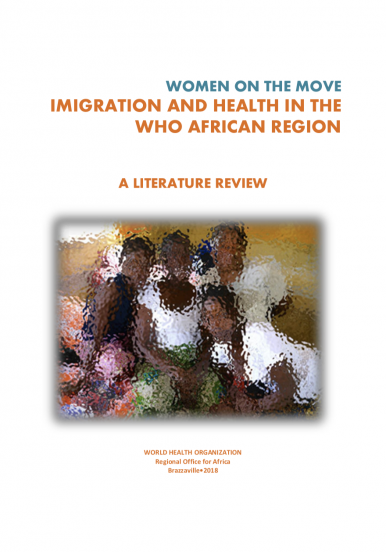
Women on the move: migration and health In the WHO African Region
Migration is a multifaceted phenomenon that plays a critical role in today’s world. Morerecently, the international importance of migration was emphasized through its inclusion on the 2030 Agenda for Sustainable Development, which recognizes the integral function of migration in achieving development goals. Furthermore, migrant health has been and continues to be an important part of the global health agenda.
The numerous positive impacts of migration include increased educational and work opportunities, and its capacity to yield a positive shift or broadening of perspectives on various social issues - includinggender equity ― among migrants and host country communities. Nonetheless, themigratory process spawns numerous challenges that sometimes generate very adverse consequences. It is important to recognize these aspects, in order to develop appropriate and responsive migration programmes and policies, and to strengthen existing ones. There is also a growing recognition of the gendered nature of migration patterns and of the fact that female migrants, in particular, face unique and specific vulnerabilities including greater risk of exploitation, abuse and trafficking; and are more likely to lag behind in progress towards the 2030 Agenda.
Statistics have shown that nearly half of all African migrants globally are women. Accordingly, it is crucial to examine their needs, vulnerabilities and capabilities, and determine how these interact with the broader global context. This report focuses specifically on the health of African female migrants, examining it through an intersectional lens which recognizes the interaction between gender and other social parameters such as age, education level, as well as marital and legal status, all of which create specific positionalities for women. Drawing on existing literature, this report presents an overview of current knowledge on women’s health throughout the migration process,describing the lived realities of African women and girls on the move, and highlighting the health issues and challenges they encounter.
The report also provides insight into the opportunities and benefits created by migration, indicating how these factors can potentially increase the agency and capabilities of African female migrants and those left behind. It also discusses the potential of the law, human rights mechanisms and international agreements to improve the rights and ensure the safety of women on the move, making policy recommendations on promoting the benefits of migration and reducing its vulnerabilities and risks for migrant women and girls.


